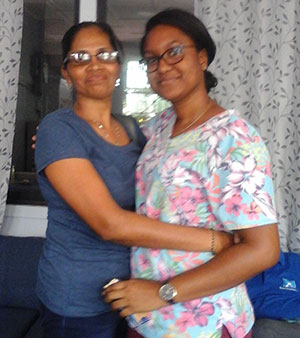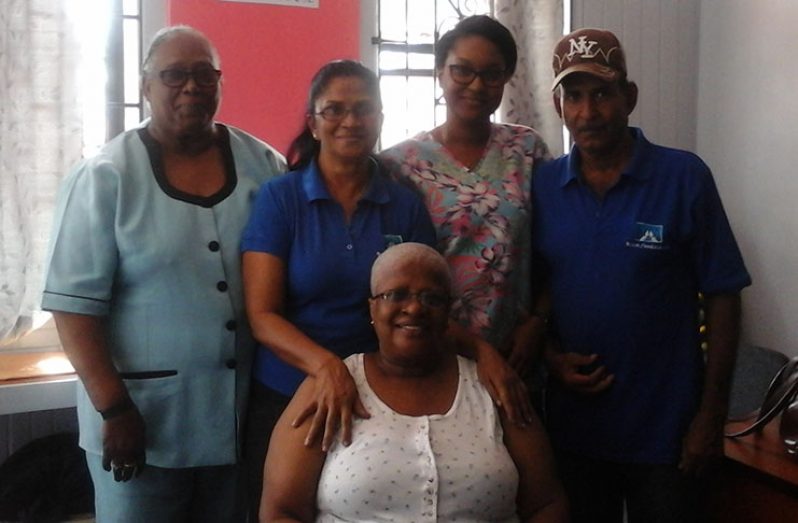The Beacon Foundation offering love and hope through its hospice
THE Christmas season and accompanying holidays are usually a time of happiness, sharing, expectancy – the hope of receiving gifts and every good thing. At the same time, however, there are those among us who though acknowledging that it is a time of joy and goodwill, might be having the most difficult time even attempting to celebrate because of a sick family member or good friend in their midst.
Yes. This is a difficult conversation to have at this time, but it is the reality.

The Beacon Foundation has a hospice care facility here in Guyana, which was conceived out of the recognition of the extent of suffering among the poor and homeless; also out of the inability of the medical system to treat terminally ill persons effectively. The Beacon Foundation commenced work here in Guyana in 1985. It aims to assist the needy, regardless of religious or political belief, sex or race.
Supervisor of the Beacon hospice, Nurse Marina Ramsden (RN), who has been working with the foundation for over 30 years, told the Pepperpot Magazine that they started out with projects such as a feeding programme for persons on the streets. The foundation also focused on ‘street boys’ with what was called a rehabilitation programme for boys who were uneducated.
“Our plan was to rehabilitate them so that we could have gotten them back into society, so that they can meaningfully serve; we taught them Mathematics and English since many of them could not read. It was sad to see that some of the boys at ages 14 – 15 years old could not even read their ABCs,” she said.
DOMICILIARY HOSPICE
Additionally, there was the domiciliary hospice and this continues up to today in an even more organised manner. This is where nurses go into the homes and look after the terminally ill; giving advice, doing pain control, counselling and showing the caregivers of patients in the home how to handle the patients with turning, changing their bed linen and many other services, Nurse Ramsden stated.
She said that the nurses at the Beacon hospice also provide palliative care for patients and families. According to the World Health Organisation (WHO), “Palliative care is an approach that improves the quality of life of patients and their families facing the problem associated with life-threatening illness, through the prevention and relief of suffering by means of early identification and impeccable assessment and treatment of pain and other problems, physical, psychosocial and spiritual.”
Additionally, it says that palliative care provides relief from pain and other distressing symptoms; affirms life and regards dying as a normal process; intends neither to hasten nor postpone death, and it also integrates the psychological and spiritual aspects of patient care.
A BUSY TIME
Even during this season, the team of nurses working out of the Beacon Hospice has found themselves very busy, moving within five of the 10 administrative regions of Guyana. As part of their work, they are literally trying to ease the pain, while giving hope and life’s expectancy to the sick, some of whom are terminally ill.
According to Nurse Bibi Salim (RN), Head of the medical team of the Beacon Hospice, at the moment the Beacon hospice team of nurses is offering palliative care to patients in regions of Three, Four, Five, Six and 10. And with a rigid schedule, they try to see their patients at least once every month. However, she said that it is unfortunate that they are not yet able to visit patients in many of the interior locations such as Regions One, Two, Three and Nine.
“The geographic of Guyana does not permit the team to go to some of the regions at the moment. Though, if we have patients in any of the regions that we are not visiting who are diagnosed with cancer, whenever they come to Georgetown they come across to us and we assist in whatever way we can; and most of them do come across and we willingly do whatever we can to help them,” she stated.
She said that most of the patients of the hospice make their first visit when they are already at stage four cancer; some are referred by the Oncology Department of the Georgetown Public Hospital Corporation (GPHC); some are referred by private doctors; some by other patients who may have received care from the hospice or their relatives; and generally anyone who knows what is done at the hospice.
ONLY BY INVITATION
Nurse Salim noted that as nurses they do extensive visits to homes, but do not go to any home unless invited. She explained that for some people there is still a stigma attached to cancer and so they do not easily open up to people outside of their immediate surroundings. Therefore, her team, she explained, having respect for the rights and wishes of each individual would not ever visit a home uninvited.
“Nonetheless, our team offers a lot of pain control through medications, most of which are provided by the Ministry of Health, at the same time they also offer multi-vitamins; advice of diet and how it can be supplemented. She said that since every patient is different they are advised differently on their approach to their meals, even though in general they are advised to stay away from meat – especially the red meats.
“However, we do not impose our ideas on them; we allow them to talk; to let us know where they are at; also what their likes and dislikes are. We actually do a lot of listening – giving them the chance to express themselves and we also do a lot of counselling,” she said.
In this regard, she stated that the team offers a bit of welfare because they have some benefactors such as the Christian Charities of Canada; Association of Guyanese Nurses and Allied Professionals (AGNAP); the Food for the Poor, as well as other organisations.
********* In addition, she informed that the Beacon Foundation at the corners of Quamina and Carmichael Streets was closed down the hospice has also been able to benefit from a lot of the proceeds of that activity.
THE NURSES’ PERSPECTIVE
Nurse Shantille Li-A-Ping, one of the younger nurses on the team explained to the Pepperpot Magazine that she had to learn how to leave her own feelings for her patients ‘at the door of the office’, so as not to transfer such feelings to her loved ones at home and elsewhere.
In fact, all the nurses were very frank in stating that, on many occasions, while rendering palliative care to their patients, they were crying on the inside and could not wait to move away from such patients to go privately and weep because of what they felt for their patients.
Nurse Ramsden noted that while as nurses they have to exhibit strength for their patients – so they encourage them and give them hope, at the same time as human beings, many times they simply cannot help but feel the pain and suffering, not only of the patients but also their families and friends.
Nurse Salim, on the other hand, noted that as head of the medical team which visits various homes, there are times when she and others have to make sure that they do not give their patients false hope.
She stated, “We have to sit with them – the patients, their families and caregivers and even as we offer palliative care, we must be able to engage them in that difficult conversation about life and death.”




.png)









